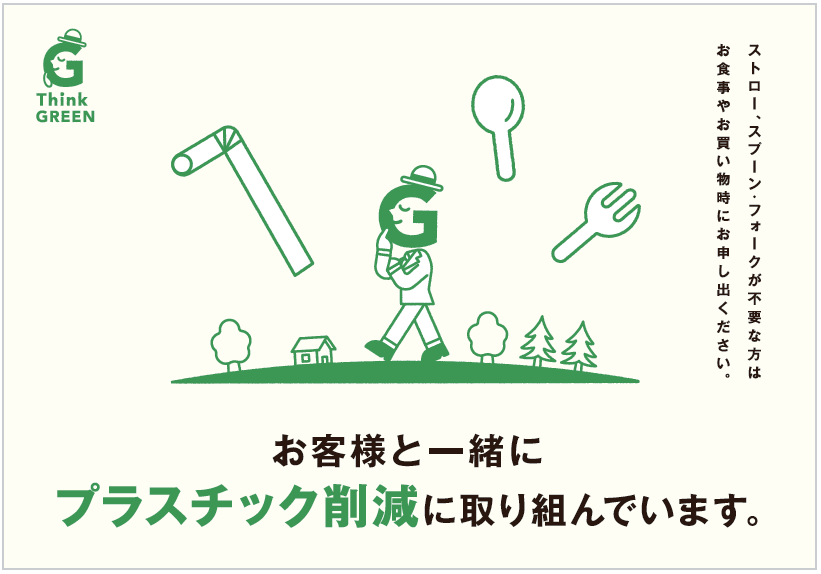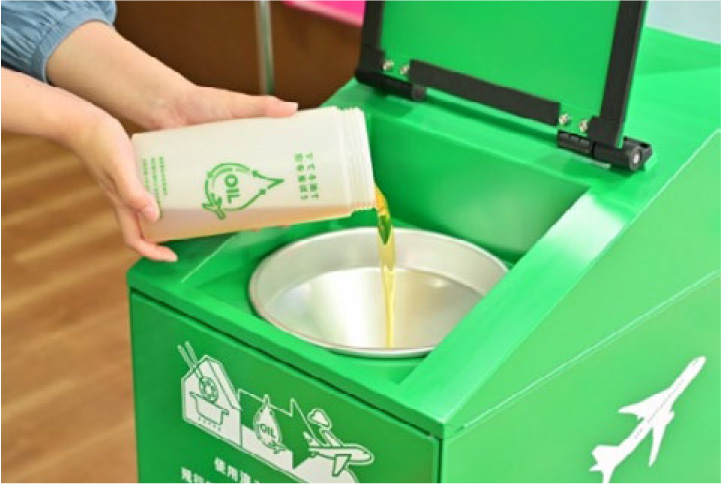- Home
- Sustainability
- Creating a society that co-exists with the environment
- Reduction of Wastes and Water Usage
Reduction of Wastes and Water Usage
The Group’s United Efforts to Reduce Waste
The Group with retail at its core has strived to reduce waste in its all companies, and particularly, we think it is important to focus on the reduction of plastic waste and food waste.
Upcycling of Plastic Waste
In November 2022, Hakata Daimaru entered a comprehensive partnership agreement with Tsushima City, Nagasaki Prefecture, for promoting SDGs. As part of this agreement, we are advancing initiatives to address the problem of marine plastic waste in Tsushima City, which is caused by various factors such as the city's topography and ocean currents.
One of these initiatives involved creating a Christmas tree decorated with ornaments made by upcycling marine plastic waste that had washed ashore. In 2024, building on previously created spherical ornaments and flowerpots made from marine plastic waste, we added decorations featuring butterflies made from upcycled plastic bottle caps. These ornaments are created through the "Precious Plastic" initiative, which upcycles waste plastic and transforms it into valuable new items. Of these, the "flowerpot," was produced through a collaborative project with eight domestic and three overseas organizations, initiated by Precious Plastic Kyushu, a group established by Hakata Daimaru Kyushu Tankentai. Going forward, we will continue expand this project by holding workshops in collaboration with local communities across Kyushu, starting with Tsushima City.

Reducing Waste Plastic
Daimaru Matsuzakaya is working to reduce its use of disposable plastics in response to the Law for Promotion of Recycling of Plastic Resources, which came into force in April 2022. For products made with specified plastics*, we are promoting the effort while gaining the understanding of customers by implementing one of the following measures in cooperation with our suppliers: (1) charging for cutlery, (2) providing cutlery only to customers who need it, or (3) changing the materials used for cutlery.
* Plastic products provided free of charge to customers in conjunction with the sale of goods or the provision of services.

Reduction in use of disposable plastic products in FY2024
Reduction target |
Results |
||
|---|---|---|---|
Amount used (basic unit)* |
Rate of reduction |
Rate of achievement |
|
-30% |
0.098 |
-92.0% |
230.1% |
* Unit settings: Total amount of disposal plastic products used at cooperating suppliers' stores (kg) / Net sales at cooperating suppliers' stores (million yen)
Resource Recycling of Waste Cooking Oil - Participation in the "Fry to Fly Project"

In September 2023, Daimaru Matsuzakaya Department Stores joined the "Fry to Fly Project," an initiative for recycling waste cooking oil which aims to achieve the first large-scale production of sustainable aviation fuel (SAF) in Japan.
As of the end of February 2025, we provide waste cooking oil from restaurants and carry-out shops at nine Daimaru Matsuzakaya stores. The amount of waste cooking oil generated by these stores is approximately 109.7 tons per year (FY2024 results), which accounts for about 74.4% of the total amount of waste cooking oil generated by all stores. We will continue to expand the number of participating stores while communicating the importance of resource recycling to our customers by holding events to raise awareness and promote the use of domestically produced SAF.


* Waste cooking oil discharged from department store locations is collected by Revo International and delivered to SAFFAIRE SKY ENERGY. SAFFAIRE SKY ENERGY aims to commence production in the second half of fiscal 2024 to early fiscal 2025 at Japan's first domestically produced SAF large-scale production plant currently under construction in Sakai City, Osaka Prefecture, where it will manufacture SAF using waste cooking oil sourced from Revo International as a raw material. JGC Holdings will oversee the overall supply chain for the SAF manufacturing business using used cooking oil as raw material.
Food Waste Recycling
Daimaru Matsuzakaya Department Stores and PARCO are expanding the number of stores with 100% food recycling rates to further promote the recycling of food waste generated at their stores. The waste will be used in feed and fertilizer production and biomass conversion. In FY2024, 19 of 31 stores achieved a food recycling rate of 100%.
FY2024 results |
Daimaru Matsuzakaya |
PARCO |
|---|---|---|
Food recycling rate |
83.2% |
97.1% |
Stores with |
7 out of 15 stores |
12 out of 16 stores |
Reduction of Water Usage
The Group, with retail as its core business, is committed to the sustainable use of resources in the JFR conduct policy, and will reduce water usage by reusing water resources and properly managing wastewater.
Activities to reduce water usage
The Group is actively engaged in activities to reduce water usage at the stores of Daimaru Matsuzakaya Department Stores and Parco, which are its main businesses.
Daimaru Matsuzakaya Department Stores
Some stores of Daimaru Matsuzakaya Department Stores use rainwater for gray water use, water-saving toilets, and employee toilets. We are also working to reduce water usage by installing water-saving devices on faucets in some food kitchens.
Parco
Parco has installed water-saving toilets in all of its stores. In addition, Parco is working to reduce water usage by using gray water (toilet drainage) and other water for miscellaneous purposes (cooling tower supply water) in some stores.
Creating a society that co-exists with the environment
-
Aiming to Achieve Net Zero by 2050
-
Environment Management System
-
Information Disclosure in Line with TCFD Recommendations
-
The Circular Economy the Group aims to create
-
Proposal for Environment-Friendly Lifestyles
-
Reduction of Wastes and Water Usage
-
Information Disclosure in line with TNFD Recommendations (Biodiversity Conservation)
-
Environmental Data
-
Acquisition of Third-Party Assurance
